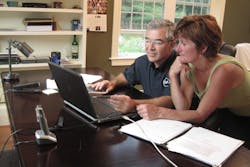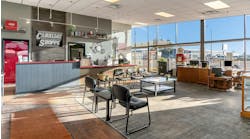Phil O’Connor runs POC Collision Inc., a three-location company in southern and central Maine. Sales run nearly $5 million a year with 30 employees, and he’s hoping to expand to more locations in the next few years. None of it would happen without O’Connor’s data-driven decision making, and his passion to keep improving.
I’m a factual person. I like to make decisions based on facts rather than emotions; we can get caught up in the emotions of the day and find ourselves spinning our wheels. I believe if we do not measure it, we cannot manage it. I want to be efficient at what I do. When I look at the facts, the numbers tell me what needs improvement.
I wake up every morning around 5 a.m. or 5:30 a.m. I usually don’t have an alarm clock. I jump right out of bed. I don’t have a lot of patience for meandering around before work. I love starting work. It’s not a job to me. It’s a passion. Some people might call it a sickness. I just can’t wait to start my day. There are so many things to do.
I usually start my day by looking at the numbers. That’s what dictates where I spend my time; the numbers tell me what my priorities are. I look at a lot of data, too; not one number is absolute. Once you start looking at all these different numbers, it tells the whole story.
I look at our daily, weekly and monthly sales, and I look at our batting average—the number of estimates they wrote versus the job they landed. I look at KPIs and examine how efficient my technicians are. I look at time cards to see how many hours my guys are working. I also do audits of estimates; I make sure that they are written thoroughly and with proper documentation.
Wherever the numbers are down or if I see issues, then that’s where I’m drawn to do mentoring or ask for more information. I like to say that if we have a problem, it’s usually because of a procedure, not a person. So if production numbers are low, it’s not that the guy isn’t producing anything; he might appear to be very slow, but he’s just very smart and very methodical. If the cycle time is high, I want to know how we’re inspecting or ordering parts. Sometimes there are training opportunities. I’ll sit down with technicians and ask them how they’re doing teardowns. I’ll talk with office staff on how they can get better at estimate and supplement writing. I tell appraisers that their work is like forensics, and I try to make it fun like CSI or Unsolved Mysteries. We think about how a dent could have happened. They think it’s so hard, and that I’m detailed six ways to Sunday. It’s not as hard as people think.
Sometimes people will call me in. If they’re struggling and need support, I’m there for them. That’s where emotion does come in sometimes. People don’t always want you coming through the shop and judging them. They’re people, not machines.
Some days I’m a cheerleader. I’ll look at their numbers and pat people on the back. I’ll also ask how their wife is doing or I’ll ask about their new baby. I love them all; they’re like friends. As an owner you have to be able to tap them on the shoulder and get personal with them. It’s what you need to do. One time I didn’t say hello to a particular technician and he thought I was upset with him. I have to understand that my facial expression and demeanor need to remain positive. If I’m having a bad day, it makes all the difference with them. They take it personal. They don’t know I’m having a bad day.
Every day is a little different. Often I will do the maintenance on our facilities, because we have older buildings. I walk by and see if a light is out, and if it is, I replace it. I look to see how clean the offices are and if there are stains anywhere. My managers don’t have time to think about those things.
I also meet with the bookkeepers regularly to talk about payables, receivables and their days. The thing is, you have to communicate with all legs of your company. You can’t just stay where you’re comfortable. Some people are only comfortable with their bookkeeper, but not the shop. Others feel the exact opposite. You have to diversify, and manage all aspects of your business.
Once a month we have manager meetings. And once a quarter we meet with a DuPont 20 Group. I can honestly say that this must be the most passionate group of body shop owners in the country.
I’ve always had a desire to improve. I don’t remember ever consciously thinking about it. It’s just a common denominator in my life. I get bored easily, and I always find a way to positively move forward. I look at policies and procedures, I take on new challenges, and I look at the latest and greatest trends in processes and repairs. It always keeps my mind rolling.
I love challenges, regardless of what they are. I thrive on it. If someone says I can’t do something, it’s almost like, let me show you what I can do. I’m not the smartest guy in the world. I graduated high school booting me in the butt to get out the door. So when I’m looking at numbers, and I’m not a numbers person, math can be real tough for me.
At one point I was embarrassed that I didn’t understand financial statements that well and yet was running a body shop. But over the years I’ve stayed with it and learned it. It was a challenge, and I overcame it.
My home office is full of business books—some books on building culture, some on forming goals for yourself, and others on working with employees. Wherever I know I have a deficit, I go down to Barnes and Noble and pick up a book to learn more.
Also in my home office I keep a chalkboard, which my wife, Kate, bought for me. On the chalkboard I write different inspirational phrases. One of them is “positive only.” It reminds me to stay positive. It’s not a natural instinct for me. I have to really work at it.
Kate works on the back end of the business, and has helped out the culture a lot. She’s helped keep the atmosphere positive.
We want to keep employees happy and give back to them. A few years ago at a Christmas party, we invited motivational speaker and body builder Dennis Rogers in. He sent the message that people can do way more than they think they can. We, as business owners, have to invest in ourselves, as well as in our people. It’s not just about making profit.
I work hard. I often don’t take a lunch. I never have enough time to do all the things I want to do. We’re trying to make a better company, and constantly working toward that.
When you set goals, you’re always reaching for something better. It’s not mundane. Some people don’t aspire for better things or have goals. I couldn’t imagine that world.
As a business owner, you have to know who you are and what you are. For example, I know that if I need to do anything analytical like crunching numbers, I do that in the morning.
In the afternoon, my artistic side comes out. That’s when I make calls to insurance agencies or have motivating conversations with people. There’s no way I could do numbers in the afternoon. I have way too much stuff in my brain by then.
Sometimes I go home at 2 p.m., and sometimes I work until 10 p.m. It just depends on the day. And I almost always check my emails at night.
Work doesn’t really shut off. I don’t mind. It’s part of my life.




